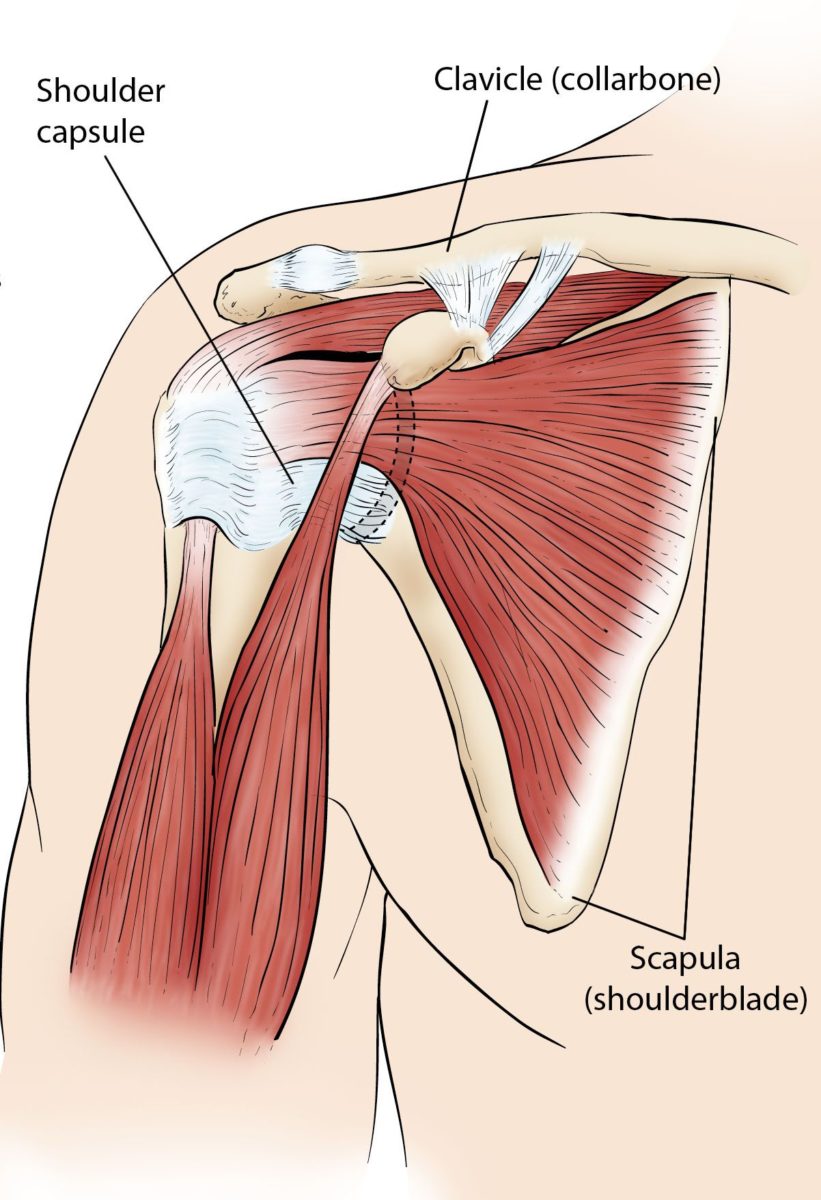Frozen Shoulder Treatment in Dallas
Adhesive Capsulitis
Home » Conditions » Frozen Shoulder
Best Frozen Shoulder Treatment
Sometimes, people experience lingering pain and stiffness of the shoulder. This is called a “frozen shoulder.” At SPORT, we specialize in treating joint pain, fractures, sprains, and much more. We understand that mobility-reducing medical conditions are frustrating, and we’re here to help restore your range of motion as soon as possible. If you or someone you know is suffering from pain or discomfort in the shoulder capsule, you need SPORT frozen shoulder treatment in Dallas. Call our office today at 469-200-2832 or fill out our online intake form.
What is Frozen Shoulder?
Also known as adhesive capsulitis, a frozen shoulder is a feeling of stiffness and pain in the joint of your shoulder. Generally, people with adhesive capsulitis experience gradual worsening of their pain and stiffness until both of these feelings dissipate. This dissipation takes anywhere from 1 to 3 years.
Your shoulder’s anatomy consists of three bones that come together to form a ball-and-socket joint. These bones are the humerus (upper arm bone), scapula (shoulder blade bone), and the clavicle (collarbone). Tissue surrounds the joint and holds everything together, which forms the shoulder capsule. When you experience adhesive capsulitis, your shoulder becomes extremely hard to move, hence the term “frozen shoulder.”
What Causes Frozen Shoulder?
Frozen shoulder occurs when the tissue and capsule surrounding your shoulder joint thicken and tighten. This restricts the movement of the shoulder joint gradually, resulting in stiffness and pain. Some factors contribute to the development of adhesive capsulitis, some of which are not avoidable. Below, we list some of the common risk factors for this condition.
- Individuals 40 and older are more likely to develop frozen shoulder.
- Women are more likely to develop frozen shoulder.
- People who experience limited mobility or immobility of the shoulder are more likely to develop frozen shoulder. Factors which result in mobility issues include rotator cuff injuries, broken arms, strokes, and surgery recovery.
- Certain diseases increase the risk of developing frozen shoulder. Examples of these diseases include diabetes, hyperthyroidism, hypothyroidism, tuberculosis, Parkinson’s, and cardiovascular disease.
- Sometimes, there is no known cause for frozen shoulder development.
What are the First Signs of a Frozen Shoulder?
Adhesive capsulitis usually develops slowly, in three stages. These stages often last a number of months. Below, we outline these stages.
- First, the “freezing stage” is indicated by a gradually limited range of motion in your shoulder. Movement of your shoulder causes pain which increases. You may also feel shoulder pain at night.
- Then, the “frozen stage” includes more stiffening, as well as more difficult use of the shoulder. Your pain might begin to subside during this stage.
- Finally, the “thawing stage” sees gradual improvement of your shoulder’s range of motion.
Sometimes, people experience greater pain at night. This could lead to difficulty sleeping or finding a comfortable position.
How to Sleep With a Frozen Shoulder?
Sleep is an important part of daily life, as it restores your energy and allows you to function properly the next day. Adhesive capsulitis can hinder your ability to fall asleep or stay asleep. However, there are ways you can ease nightly discomfort with just one pillow.
- If you prefer to sleep on your back, we recommend placing a pillow underneath the arm of your affected shoulder. Rest your hand on your stomach and elevate your knees with another pillow if possible.
- If you prefer to sleep on your side, avoid sleeping on the affected shoulder. Hug a pillow to your chest.
- While sitting, try to maintain good posture. Do not slump or slouch, and keep your shoulders back as much as possible.
How to Treat a Frozen Shoulder?
In order to diagnose adhesive capsulitis, your doctor will perform a physical examination. You will likely be asked to move your arms and shoulders in certain ways to check for both pain and range of motion. Then, your doctor will ask you to relax. They will move your arms and shoulders themselves. Sometimes, doctors inject anesthetic to the area to determine both your passive and active ranges of motion. In most cases, doctors feel comfortable diagnosing frozen shoulders based on signs and symptoms. However, sometimes doctors request imaging tests, such as X-rays, to rule out other problems.
At-Home Treatments & Medications:
Treatments for frozen shoulder involve a variety of options. For the most part, adhesive capsulitis treatment involves pain management and preserving the affected shoulder’s range of motion. For comfort and inflammation reduction, we recommend over the counter pain medications, such as aspirin or ibuprofen. In some more severe cases, we might prescribe stronger medications to ease pain and inflammation.
Physical Therapy:
Our experienced SPORT physical therapists have extensive knowledge on exercises that can help with restoring or maintaining your range of motion. However, once we teach you how to do these exercises on your own, we highly recommend sticking to them. Especially during the “freezing” and “frozen” stages, it is important to engage your shoulder muscles at least once an hour if possible.
Surgical & Other Procedures:
In most cases, frozen shoulders improve after anywhere from 12 to 18 months. If your symptoms persist past this time, or worsen, tell your doctor immediately. Below, we list a range of options our providers suggest when time and therapy do not correct the problem.
- Steroid injections help to decrease pain and improve mobility. This is especially true when these injections take place during the “freezing” stage of the condition.
- Joint distension, which is an expansion of the shoulder capsule with sterile water injections, makes it easier for patients to move the affected joint.
- With the aid of general anesthetic, your doctor might perform shoulder manipulation. During this process, you are unconscious and feel nothing. Your doctor moves the joint of the affected shoulder in different directions, which loosens the tissue.
- Surgery is rare, but still possible for serious cases. This is generally a last resort, after nothing else has worked. This surgery serves to remove scar tissue and other adhesions from within the joint of your shoulder. During the surgery, most doctors use arthroscopic methods through which to remove the tissue.
Lifestyle Changes & Home Remedies:
Taking into account your personal pain levels and range of motion limits, use the affected shoulder as much as possible. This helps to prevent loss of range of motion. Applying cold or heat packs also help to reduce pain.
How to Prevent Frozen Shoulder?
Taking steps to prevent adhesive capsulitis is simple. Regularly engage in gentle range-of-motion exercises, stretch your shoulders, and use your shoulder at least once every hour. These tips help the prevention of frozen shoulder, especially after a surgery or an injury. Some cases have no known cause, so they might not be preventable. We recommend patience and following your doctor’s advice as closely as possible. In almost all cases, frozen shoulder improves with time.
How Long Does Frozen Shoulder Last?
The time it takes for adhesive capsulitis to improve varies from case to case. In general, a frozen shoulder may take from 1 ½ to 2 years to fully recover. In rare cases, it could take as long as 5 years to fully recover. Pain and stiffness do eventually fade, but it largely depends on your body, as well as how dedicated you are to your doctor’s treatment plan.
Frozen Shoulder Exercises
Our SPORT physical therapists offer personalized exercise and physical therapy plans to suit your needs. One of the cornerstones of frozen shoulder treatment is exercise. By engaging in gentle shoulder exercises each day, you can help prevent losses to your range of motion. Below, we list some exercises that we highly recommend for those suffering from a frozen shoulder.
- Pendulum stretch
- Finger walk
- Towel stretch
- Armpit stretch
- Cross-body reach
- Outward rotation
- Inward rotation
Schedule Your Shoulder Appointment Today
Shoulder pain and stiffness can be highly detrimental to your daily routine. Luckily, our surgeons offer a number of surgical treatment options, including shoulder instability surgery. For the best in Dallas physical therapy, you need our highly experienced team at SPORT. Our practice prioritizes the individual needs of our patients, and focuses on giving them their life back. From the beginning to the end of your frozen shoulder treatment, a board-certified orthopedic expert will be with you every step of the way. To set up your appointment with an orthopedic specialist Dallas, give us a call at 469-200-2832, or fill out our online intake form. We may be industry leaders, but we never forget what’s important to you: getting your life back on track.



